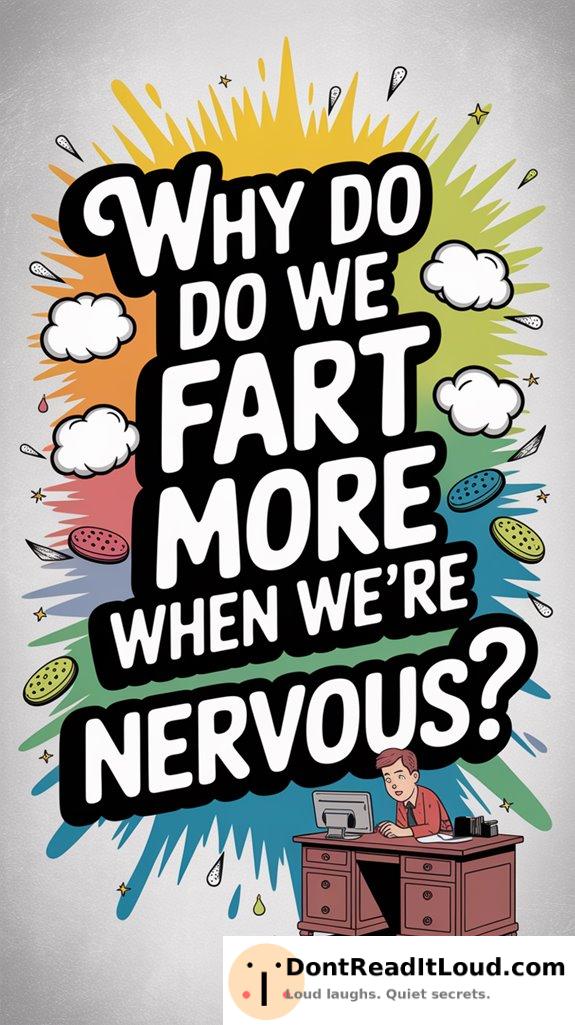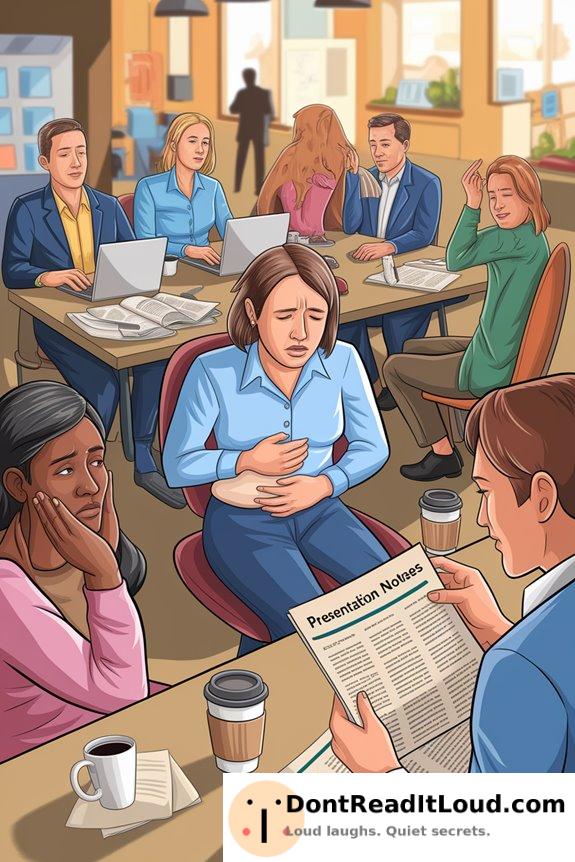
When you’re nervous, your body goes into high alert—speeding up digestion and causing you to breathe faster, which makes you swallow extra air. Stress hormones like cortisol and adrenaline increase gut activity, often making you gassier. You might also eat quickly or reach for comfort foods that are harder to digest, boosting flatulence. It’s a perfect storm for more frequent gas. Curious what you can do about it or which habits make it worse?
The Gut-Brain Connection: How Stress Affects Digestion

When you’re stressed, your brain sends signals that disrupt your gut’s natural rhythm, making digestion less effective. This connection between your brain and digestive system is known as the gut-brain link.
Stress can upset the balance of helpful bacteria in your intestines, known as the gut microbiome. When this balance shifts, you might notice more gas and bloating.
Stress can also lead to emotional eating, often involving foods that are tough to digest or increase gas production. These combined effects can change how your digestive system works, leading to more frequent or noticeable farting.
What Happens to Your Body During Anxiety

When anxiety strikes, your body quickly shifts into high alert, causing a range of physical changes. You might feel your heart pounding, your palms sweating, or your breathing becoming rapid and shallow.
These bodily reactions are meant to help you respond to a perceived threat. Blood flows more to your muscles, your senses sharpen, and your digestive system slows. Your stomach can feel unsettled, sometimes leading to bloating or cramps.
Muscle tension may also affect your gut, making discomfort more noticeable. All these responses are built-in survival mechanisms, even if there’s no real danger present.
The Role of Hormones in Nervous Flatulence

Behind those physical reactions to anxiety, your hormones play a major role—especially stress hormones like adrenaline and cortisol.
When you’re nervous, your body releases these chemicals in response to perceived threats. These hormonal changes can speed up your digestive system, making your gut more active than normal.
This increased activity leads to more gas production and faster movement of gas through your intestines. As a result, you might notice more frequent or urgent flatulence during stressful moments.
Changes in Breathing and Swallowing Air

If you’ve ever noticed your breathing speeding up during tense moments, you’re not alone—anxiety often affects how you breathe.
When you feel nervous, you may lose control of your breath and start taking quick, shallow inhales. This pattern of breathing makes it easier to swallow extra air without realizing it.
Each hurried breath or gulp can send more air into your digestive tract. That air eventually needs to escape, often as gas.
Stress-Induced Changes in Gut Motility

When you’re under stress, your body releases hormones that can either speed up or slow down digestion.
Gut motility is controlled by nerve signals traveling from your brain to your digestive system. If motility increases, food and gas move faster through your gut, which can cause you to pass gas more often.
If digestion slows, gas may build up, causing bloating and unexpected releases.
Because your brain and gut constantly communicate, feeling nervous can disrupt normal digestion and make gas more frequent or noticeable.
Foods and Habits That Make Nervous Gas Worse

Although feeling nervous can trigger excess gas, certain foods and habits can make it much worse.
If you’re anxious, eating beans can increase gas, since they’re hard to digest. Drinking carbonated beverages—like soda or sparkling water—adds extra air to your system, which can make you feel even more bloated.
Spicy foods may irritate your digestive tract, resulting in increased discomfort. Dairy products can cause additional gas if you’re lactose intolerant, especially when you’re stressed.
These triggers, combined with anxiety, often lead to more frequent and uncomfortable flatulence.
Tips for Managing Gas When You’re Anxious

Managing gas during anxious moments starts with practical changes to your daily routine.
Practice mindful eating by slowing down and chewing your food well. Opt for smaller, more frequent meals to support digestion.
Try deep belly breathing to relax and help prevent swallowing extra air. Drink water slowly instead of gulping it.
Cut down on carbonated beverages and skip chewing gum, as both can cause you to swallow more air.
If stress brings on your symptoms, create a routine for managing anxiety.
These simple habits can help you feel more at ease and confident.
Conclusion
When you’re nervous, your body responds in surprising ways—one of them is increased farting. Stress disrupts digestion, alters hormone levels, and causes you to swallow more air. Certain foods and habits can intensify the effect. The good news is that understanding the gut-brain link and calming your nerves can help reduce gas. Next time anxiety hits, remember to breathe deeply, make mindful snack choices, and treat your digestive system gently.



